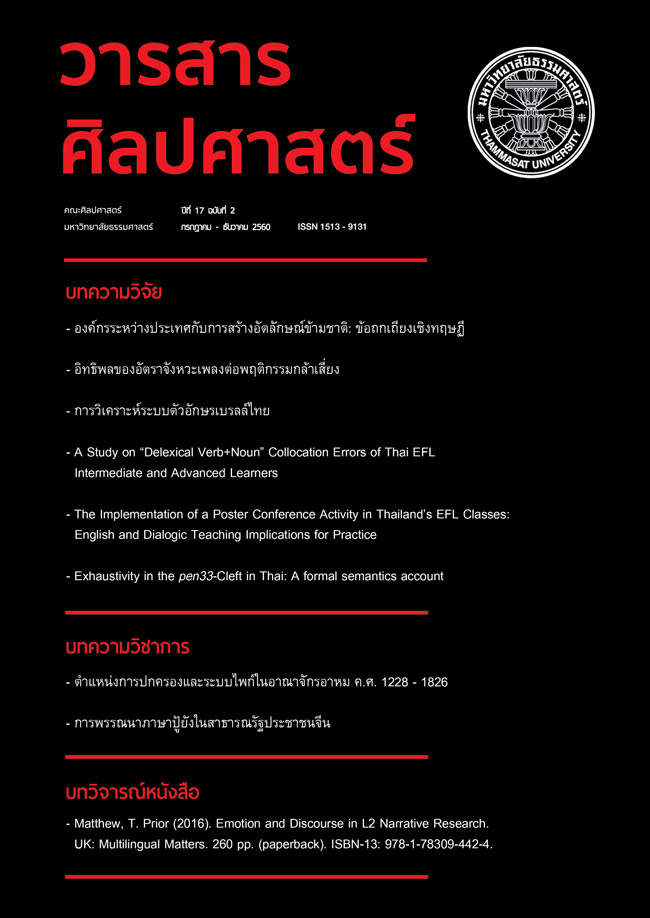องค์กรระหว่างประเทศกับการสร้างอัตลักษณ์ข้ามชาติ: ข้อถกเถียงเชิงทฤษฏี
Main Article Content
บทคัดย่อ
บทความนี้ต้องการสำรวจข้อถกเถียงเชิงทฤษฏีบางประการที่มุ่งในประเด็นว่า องค์กรข้ามชาติสามารถสร้างลักษณะหรือคุณสมบัติที่เป็นองค์ประกอบการสร้างอัตลักษณ์แบบข้ามชาติได้หรือไม่ และอัตลักษณ์แบบข้ามชาติกับอัตลักษณ์ชาติจะอยู่ร่วมกันได้หรือเป็นคู่แข่งที่แย่งชิงความจงรักภักดีจากมวลชน
ความสนใจของนักวิชาการต่อเรื่องนี้เกิดจากแผนการส่งเสริมอัตลักษณ์ยุโรปของสหภาพยุโรป โดยเฉพาะอย่างยิ่งตั้งแต่สนธิสัญญาสหภาพยุโรปปี 1992 ดังนั้น สหภาพยุโรปจึงถูกใช้เป็นกรณีศึกษา การศึกษาเรื่องนี้ปรากฏในหลายศาสตร์ วิธีการศึกษาจึงมีหลากหลาย เราสามารถสรุปได้ว่า นักวิชาการมีความเห็นต่างกัน นักทฤษฏีแนวลัทธิชาตินิยมเห็นว่า องค์กรข้ามชาติขาดลักษณะแทบทั้งหมดที่ประกอบสร้างความเป็นชาติ จึงเป็นไปได้ยากที่จะสร้างอัตลักษณ์ข้ามชาติได้ ในอีกแง่หนึ่ง นักวิชาการอีกกลุ่มหนึ่งเห็นว่า การศึกษาอัตลักษณ์ข้ามชาติไม่จำเป็นและไม่สามารถใช้กรอบการศึกษาแนวลัทธิชาตินิยม อัตลักษณ์ยุโรปสามารถสร้างขึ้นจากพื้นฐานที่เน้นความเป็นพลเมืองตราบเท่าที่อัตลักษณ์นี้เน้นเรื่องสิทธิทางกฎหมายและการเมือง
Downloads
Article Details

This work is licensed under a Creative Commons Attribution-NonCommercial-NoDerivatives 4.0 International License.
References
Anthony D. Smith. (1986). Ethnic Origins of Nation. Oxford: Blackwell Publishing.
Benedict Anderson. (1983). Imagined Communities: Reflections on the Origin andSpread of Nationalism. London: Verso.
Bruter, M. (2005). Citizens of Europe?: The emergence of a mass European identity. Basingstoke and New York: Palgrave Macmillan.
Carey, S. (2002). Undivided loyalties. Is national identity an obstacle to European integration?. European Journal of International Relations, 7, 139-174.
Chhristin, J. (2008). Reasonable Europeans: Determinants of citizens’ support for the delegation of competencies in 29 countries. Baden-Baden: Nemos.
Ernest Gellner. (1983). Nations and Nationalism. Ithaca: Cornell University Press.
Hooghe, L. & Marks, G. (2005). Calculation, Community and Cues: Public Opinion on European Integration. European Union Politics, 6(4), 419-443.
John Hutchinson & Anthony D. Smith. eds. (1994). Nationalism. Oxford: Oxford University Press.
Karl Deutsch. (1953). Nationalism and Social Communication: an inquiry into the foundations of nationality. London: Chapman & Hall.
McLaren, L. (2004). Opposition to European integration and fear of loss of national identity: debunking a basic assumption regarding hostility to the integration project. European Journal of Political Research, 43(6), 895-911.
Neil Fligstein. (2008). Euroclash: The EU, European Indentity, and the Future of Europe. Oxford: Oxford University Press.
Philip Spencer & Howard Wollman. eds. (2005). Nations and Nationalism: A Reader. Edinburgh: Edinburgh University Press.
Rawi Abdelal, Yoshiko M. Herrera, Alastair Iain Johnston & Rose McDermott. eds. (2009). Measuring Identity: A Guide for Social Scientists. Cambridge: Cambridge University Press.
Rebecca Friedman & Markus Thiel. eds. (2012). European Identity andculture: Narratives of Transnational Belonging. Surrey: Ashgate Publishing Company.
Richard K. Herrmann, Thomas Risse & Marilynn B. Brewer. eds. (2004).Transnational Identities: Becoming European in the EU. Lanham, MD: Rowman & Littlefield.
Rodolfo C. Severino. (2006). Southeast Asia in Search of An ASEAN Community. Singapore: Institute of Southeast Asian Studies.
Sonia Lucarelli, Furio Cerutti & Vivien A. Schmidt. eds. (2011). Debating Political Identity and Legitimacy in the European Union. London: Routledge.
Staffan Zetterholm. ed. (1994). National Culture and European Integration: Exploring Cultural Diversity and Common Policies. Oxford: Berg Publishers.
Vries, C. de & Kersbergen, K. van. (2007). Interests, identity, and political allegiance in the European Union. Acta Politica, 42(2-3), 307-328.
W J. Sewell Jr. (2005). Logics of History: Social Theory and Social Transformation. Chicago: University of Chicago.

